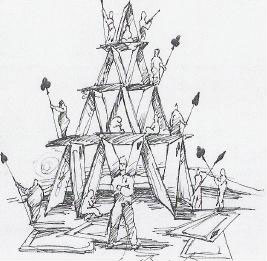

| |
|  A House of Cards
As we turn the page of a new calendar year, I reflect on what I like and don’t like about working in a prison, a job I’ve performed since 1977. Each year of my service represents a playing card in an incomplete deck. Somehow I don't think the game could be played fairly even if the deck were full. Pros Prisons give me a sense of security. Some of our neighborhoods are considered more dangerous than others and my art studio is located in a section of town with a relatively higher crime rate. When I attempt to clean up the neighborhood, I’ve had beer bottles thrown at me and broken glass scattered across my yard. Once, a female neighbor was shot at. My studio has been vandalized with smashed walls and graffiti spray-paint. One day while working in prison, I recognized one of the convicted vandals walking across the yard where he belonged. I liked him being in prison. One time a neighbor’s meth lab blew-up in their rented garage and the DEA squat teams raided the area several times. Today when authorities are summoned, the sheriff arrives within minutes. I like it that the cops continue to be attentive to areas of concern. Some thirty years ago the San Diego Gaslamp District was in a similar state of violence. As a low rent district, it was occupied by artists and the poor. An artist friend was shot in the leg and another friend witnessed two stabbings. For these reasons, I like prisons. It keeps dangerous people off the streets. Cons The prison riots at Attica New York (nearly thirty years ago) taught prison employees to communicate with inmates. That massive riot left some prison informants faceless, as their features were melted off with hot blow torches. The lessons were hard learned and generated the onset of prison reform. Communication between prison employees and inmates was encouraged. Employees liked by inmates are often warned of planned violence. The lessons learned from the Attica riot have since been forgotten. Now correctional officers speak condescending to inmates, as well as to non-uniformed employees, teachers, lock-smiths and other staff who don’t wear the green uniform of correctional officers. Inmates wear blue. I recall a time when I was working in a prison yard the size of a sports arena, casually talking with a convict I’d known for years. Many convicts reveal personal information about themselves, about their families and sometimes speak openly of their criminal activities. I'm not talking about the typical banter of: “I’m innocent and in prison for only using marijuana.” Rather they speak honestly: “I’m not proud of what I did, but I murdered two people with a pick axe and will never get out of prison.” Or “I killed a mob boss for threatening to kill my little boy. That was twenty-two years ago, and I will never get out.” I listen because I believe it fosters communication, making the prison environment that much safer for both prison employees and inmates. Another thing I don't like about prisons is the pattern of ambitious correctional officers rising quickly up the ranks, officers too young to recall the lessons and atrocities of the Attica riots. These officers often admonish casual conversations between prison staff and inmates, concluding that the encounters are a form of over-familiarization, something they were taught in the academy. I also don’t like the word rehabilitation existing largely on paper and in the form of reports and statistical documentation, but nearly non-existent in practice. I don’t like prison employees who are handsomely paid to rehabilitate and educate inmates, making their priorities their pay checks, pay raises, vacation time and retirement benefits. Union perks take precedence over working -- sincerely working to change the lives and attitudes of incarcerated inmates. This is what I don’t like about prisons. Like a house of cards appearing stable, tampering with any part of it may collapse the entire structure. If a change in attitude of prison employees and the me-first unions is the movement that consequently causes the prison system as it now exists to collapse, then perhaps that action is one that is long overdue. David Beck-Brown |
||